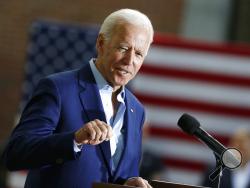WASHINGTON (AP) — Racism in America is an institutional "white man's problem visited on people of color," Vice President Joe Biden said Tuesday, arguing that the way to attack the issue is to defeat President Donald Trump and hold him responsible for deepening the nation's racial divide.
Taking aim at incendiary racial appeals by Trump, Biden said in an interview with a small group of reporters that a president's words can "appeal to the worst damn instincts of human nature," just as they can move markets or take a nation into war.
Biden is leading his Democratic challengers for the presidential nomination in almost all polls, largely because of the support of black voters. He has made appealing to them central to his candidacy and vowed to make maximizing black and Latino turnout an "overwhelming focus" of his effort. The interview, more than an hour long, focused largely on racial issues.
"White folks are the reason we have institutional racism," Biden said. "There has always been racism in America. White supremacists have always existed, they still exist." He added later that in his administration, it would "not be tolerated."
By highlighting the nation's racial tensions and placing blame on Trump, Biden is showing that he, too, is willing to make race a core campaign issue, but from the opposite perspective of the president. Turnout and enthusiasm among black voters will be critical for the Democratic nominee, notably to try to reclaim states like Pennsylvania, Michigan and Wisconsin. He also emphasized a crossover appeal to both black voters and non-college-educated white voters.
To accentuate his appeal to black voters, Biden said that he will advertise in black publications and engage with cultural institutions like the black church, black fraternities and sororities, and historically black colleges.
"The bad news is I have a long record. The good news is I have a long record," Biden said when asked about his enduring support among black voters. "People know me — at least they think they know me. I think after all this time, I think they have a sense of what my character is, who I am."
"I've never, ever, ever in my entire life been in a circumstance where I've ever felt uncomfortable being in the black community," he added, suggesting that his familiarity was not matched by many of his competitors.
While he did not specify to whom he was referring, Biden said he believes there are "assertions and assumptions" made about black voters that he believes are inaccurate, and he said that "a lot of people haven't spent much time in the community."
Without mentioning her by name, Biden also referenced California Sen. Kamala Harris' attack on him during the first presidential debate on the issue of busing as a solution to school desegregation.
"All I know is I don't think anybody in the community thinks I am — what's the phrase?" Biden asked, paraphrasing Harris' comment that "I know you're not a racist, Joe."
"I don't think anyone thinks that about me," Biden said.
Biden was also asked whether he would select a woman or person of color as his running mate should he become the nominee. He said that while he would "preferably" do so, he is ultimately seeking a partner on the ticket who is "simpatico with what I stand for and what I want to get done."
"Whomever I pick would be preferably someone who was of color and who was of a different gender, but I'm not making that commitment until I know that the person I'm dealing with I can completely, thoroughly trust, is authentic, and is on the same page."
Looking ahead to the next Democratic debate in Houston in September, he said that he understands why he has a target on his back but cautioned that Democrats "shouldn't be forming a circular firing squad and shooting" because it only helps Trump.
Trump's reelection campaign dismissed Biden's accusation that Trump had inflamed racial tensions in the country.
"Having moved on from the Russia Hoax, Democrats are now employing the oldest play in the Democrat playbook: falsely accusing their opponent of racism, extending it even to the President's supporters. Calling half the country racist is not a winning strategy," said Tim Murtaugh, the Trump campaign's communications director.
Biden also said that the Democratic field would narrow and allow for more meaningful exchanges. In the current crowded field, he said it's difficult to have any meaningful debate at all, calling it a "non-debate debate."
Biden, who has been attacked most forcefully by Harris, said that he believed "those who made the most direct attacks on one another haven't really benefited much by it at the end of the day."

